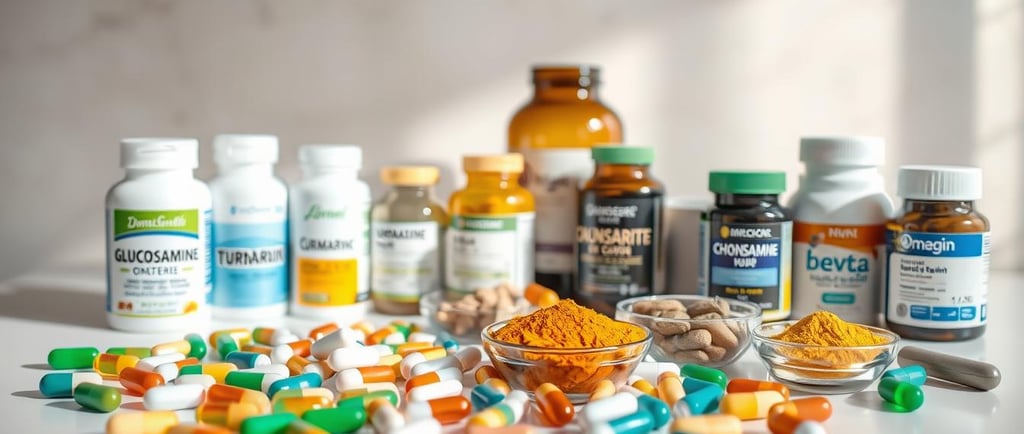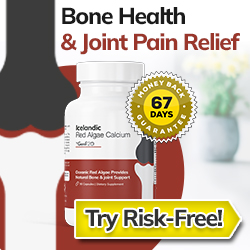Top Supplements for Reducing Joint Inflammation
Find the most effective supplements for reducing joint inflammation and promoting overall joint health.
BONES & BODY WEIGHT
ActiveVitaLife
3/22/20259 min read
Millions of people deal with joint pain every day. The question is, can the right supplements really help more than you think? Joint inflammation affects over 50 million U.S. adults, making everyday tasks hard and often leading to medication use. This article looks into science-backed supplements to reduce joint inflammation, providing natural solutions supported by research.
Many are curious if supplements like omega-3 or turmeric really work. This guide sorts fact from fiction, focusing on evidence-based options. Find out which supplements target inflammation and how they stack up against traditional treatments. Learn how combining supplements with lifestyle changes can lead to better results.
Key Takeaways
Over 50 million Americans face joint inflammation, seeking safe alternatives to pain relievers.
Supplements like omega-3s and curcumin have shown promise in reducing inflammation markers in studies.
Proven options exist for those avoiding long-term medication use.
Expert recommendations prioritize dosages and formulations backed by clinical trials.
Combining supplements with diet and exercise improves joint health outcomes.
Understanding Joint Inflammation
Joint inflammation happens when the body's immune system causes swelling and pain. This can protect us from injury or infection. But, it becomes a problem if it lasts too long.
Knowing the difference between acute and chronic inflammation helps us understand why some pain goes away quickly. Others can last for months or even years.
What Causes Joint Inflammation?
Autoimmune conditions like rheumatoid arthritis and lupus attack joint tissues, causing long-term damage.
Osteoarthritis develops from cartilage breakdown over time, often linked to aging or repetitive strain.
Injuries, overuse from sports, or poor posture strain joints, triggering inflammation.
Lifestyle factors such as obesity, smoking, or diets high in processed foods worsen inflammation.
Common Symptoms of Joint Inflammation
Spotting signs early can lead to better treatment. Look out for:
Persistent pain during movement or rest
Swelling that feels warm to the touch
Stiffness lasting over an hour upon waking
Redness or visible skin changes near affected joints
These signs tell us if the inflammation is short-term or a sign of a bigger problem like an autoimmune disorder. Knowing this helps us see how supplements might help fix the problem, not just the symptoms.
The Role of Supplements in Joint Health
Joint health supplements aim to fix the main problems causing pain and damage. They help the body repair itself naturally and control inflammation. It takes time, often weeks, to see the full benefits of using them regularly.
How Supplements Work
They block enzymes like cyclooxygenase (COX-2) that cause inflammation.
They boost collagen production to fix cartilage and connective tissues.
They make synovial fluid thicker, which reduces bone friction.
Benefits of Using Supplements
They help reduce morning stiffness and pain when moving.
They improve joint flexibility and how far you can move them.
They help you use less over-the-counter painkillers.
They are a gentle way to keep your joints healthy for a long time.
Choosing the right supplement is important. Look for ones with scientific studies backing them up. Also, check if they have third-party lab tests to ensure they are safe and effective.
The best supplements have nutrients like curcuminoids or glucosamine sulfate in forms that your body can easily use. Remember, it can take 6–8 weeks of daily use to see noticeable improvements.
Omega-3 Fatty Acids
Omega-3 fatty acids, like EPA and DHA, are important for anti-inflammatory supplements for joints. They stop inflammatory cytokines, which helps reduce pain and stiffness. Studies show they help control the body's immune response to joint inflammation.
Sources of Omega-3s
Fish oil: High in EPA/DHA, effective for joint support
Krill oil: Contains astaxanthin for enhanced stability
Algal oil: Vegan-friendly alternative with concentrated DHA
Flaxseed oil: ALA conversion to EPA/DHA is limited but beneficial
Food sources like salmon, mackerel, walnuts, and chia seeds also offer omega-3s. For those who don't eat fish, algae-based supplements are a good option.
Recommended Dosages
General maintenance: 500-1,000mg EPA/DHA daily
Joint inflammation: 2,000-3,000mg EPA/DHA under medical guidance
Look for supplements with third-party testing to ensure quality. High doses might increase bleeding risk. Always talk to a doctor before taking more than 3,000mg daily.
Turmeric and Curcumin
Turmeric's active part, curcumin, is known for its anti-inflammatory powers. It can stop inflammatory enzymes like COX-2 and NF-kB, similar to NSAIDs but safer for your stomach. Studies show it helps with arthritis pain and improves joint movement.
Benefits of Curcumin for Inflammation
Curcumin fights oxidative stress and inflammation, which harm joints. Research shows it reduces stiffness in people with osteoarthritis and rheumatoid arthritis. A 2021 review in the Journal of Medicinal Food found it might slow cartilage loss.
Best Ways to Incorporate Turmeric
Curcumin's absorption is low alone, but adding piperine (black pepper extract) can increase it by up to 2,000%. Look for supplements that combine these. You can find it in:
Standardized extracts (95% curcuminoids)
Liposomal or phytosomal curcumin for better absorption
Use turmeric in your cooking: sprinkle it on roasted veggies, blend into smoothies, or make golden milk. Daily doses are usually 500–1,000mg of extract, but check the label for the best mix.
Glucosamine and Chondroitin
Glucosamine and chondroitin are key ingredients in joint support supplements. They help with joint discomfort. These compounds keep cartilage healthy and reduce inflammation.
How They Support Joint Health
Glucosamine helps rebuild cartilage, the tissue that cushions joints. Chondroitin keeps joints fluid, making them more flexible and able to absorb shock. Studies suggest these supplements may slow cartilage breakdown in osteoarthritis.
Some research shows reduced pain and better mobility after 2–4 months of use.
Glucosamine stimulates collagen production for joint structure repair.
Chondroitin blocks enzymes that degrade cartilage, protecting joint integrity.
Choosing the Right Formulation
Glucosamine comes in sulfate and hydrochloride forms, with sulfate being more effective. Chondroitin is often from animal cartilage, but there are vegetarian options. Many joint support supplements also include MSM, which may improve absorption.
Recommended daily doses are 1,500 mg glucosamine and 1,200 mg chondroitin.
Check labels for “glucosamine sulfate” as the preferred form.
Consider source type: shellfish-based or vegan-friendly options.
Always talk to a healthcare provider to find the right dosage for you. They can help you track how well these joint support supplements work. Being consistent is important to see benefits.
Boswellia Serrata
Boswellia serrata comes from Ayurvedic tradition. It's a natural way to care for your joints. Its boswellic acids fight inflammation by stopping 5-lipoxygenase (5-LOX) and leukotriene production. This is different from what many supplements do.
Anti-Inflammatory Properties
Studies show it helps with osteoarthritis and rheumatoid arthritis. Boswellic acids, like Acetyl-11-keto-β-boswellic acid (AKBA), reduce pain and boost mobility in just 7 days for some. A 2021 review in the Journal of Ethnopharmacology found it lowers inflammation markers like C-reactive protein.
Dosage Recommendations
Quality is key: Choose extracts with 30-65% boswellic acids. Daily doses of AKBA should be 100-250mg. Total boswellic acid doses are 300-500mg per serving. Take it 2-3 times a day with meals.
Standardized extracts ensure consistent AKBA content
Start with lower doses and monitor response
Avoid if taking blood thinners due to possible interactions
Make sure to check for third-party certification (USP, NSF) for purity. Talk to a healthcare provider before mixing it with anti-inflammatory drugs.
Vitamin D and Joint Health
Vitamin D is key for joint health, not just bone strength. It fights inflammation, boosts the immune system, and makes muscles stronger. These are all important for joint pain relief supplements. Yet, many don't realize its effect on long-term joint pain.
The Connection Between Vitamin D and Joint Pain
Low vitamin D levels are linked to more arthritis pain and autoimmune diseases like rheumatoid arthritis. Research shows that those with low levels often have higher inflammation. At-risk groups include:
Residents of northern U.S. states
Those with limited sun exposure
Adults over age 50
People with darker skin tones
Safe Levels of Vitamin D Intake
First, get blood tests to check your levels. The right dose is 1,000–2,000 IU daily. If you're deficient, you might need more, but only with a doctor's okay. Always pick vitamin D3 for better absorption. Talk to a doctor before starting, if you're on meds that affect calcium or kidney function.
Ginger Root as a Natural Anti-Inflammatory
Ginger root has been used for centuries to help with joint pain. It contains compounds like gingerols and shogaols. These block the pathways that cause inflammation by stopping COX-2 enzymes and cytokines.
Studies show ginger extracts work as well as ibuprofen in reducing stiffness in osteoarthritis patients. But ginger is gentler on the stomach.
How Ginger Works
Ginger has two main effects: it stops pro-inflammatory molecules and boosts antioxidants. A 2020 review in the Journal of Medicinal Food found ginger supplements reduced pain by 30% in rheumatoid arthritis trials. It works like NSAIDs but doesn't harm the stomach.
Ways to Consume Ginger
Fresh root: grate into stir-fries or steep in hot water for tea
Standardized extracts: look for 5% gingerol content in certified organic supplements
Teas and tinctures: herbal blends combining ginger with turmeric amplify anti-inflammatory effects
"Ginger’s bioavailability improves when paired with black pepper extracts like piperine," noted Dr. Linda Lee, arthritis researcher at Johns Hopkins.
Effective dosages range from 500-1,000mg daily. Start with lower doses to avoid heartburn. Those on blood thinners should consult doctors due to possible clotting interactions. Always choose USP-certified supplements to ensure purity. Pair with a balanced diet rich in omega-3s for better joint support.
Collagen Supplements
Collagen is key for healthy joints. It helps build cartilage and connective tissues. Research shows it can help reduce pain and improve movement for those with joint issues. For top-rated joint supplements, collagen is often a top choice because it works well with the body's repair processes.
Benefits of Collagen for Joints
Studies say collagen supplements can lessen stiffness and swelling. They provide amino acids needed to fix cartilage. People often feel less pain in their knees and hips after using them.
A 2022 review in the Journal of Clinical Medicine found joint function improved after 3-6 months of use.
Types of Collagen Supplements
Hydrolyzed collagen peptides: These are easy to digest and come from fish or cows. You need 10-20g daily.
Undenatured type II collagen (UC-II): This is focused on joint support and works well in small doses (2.5-50mg).
Gelatin: It's less effective but cheaper. You can use it in cooking or drinks.
“Collagen’s ability to stimulate the body’s own repair mechanisms makes it a promising addition to joint care regimens.” – Dr. Emily Carter, Orthopedic Nutritionist
When picking top-rated joint supplements, look for ones with collagen, vitamin C, zinc, or MSM. Marine-sourced collagen is good for those who can't eat bovine products. Always talk to a doctor before trying new supplements.
Probiotics and Joint Inflammation
Research shows a strong gut-joint connection between probiotics and less inflammation. The gut microbiome is vital for our immune system. When it's out of balance, it can lead to more inflammation in our joints. This section looks into how probiotics might help with joint pain.
Gut Health's Impact on Inflammation
Studies link intestinal permeability ("leaky gut") and changes in bacteria to diseases like rheumatoid arthritis. Gut bacteria can either fight or fuel inflammation. For example, an imbalance can cause toxins that harm our joints.
Best Probiotic Strains for Joint Support
Lactobacillus strains like L. acidophilus lower harmful cytokines.
Bifidobacterium species help keep the gut healthy, reducing toxins.
Look for supplements with CFU counts over 10 billion and many strains. Choose ones that stay good on the shelf. Taking them every day for 8-12 weeks works best, studies say.
Even though research is new, it looks promising. Probiotics might tackle the root causes of inflammation, not just the symptoms. Always talk to a doctor before trying new supplements.
Conclusion: Choosing the Right Supplements
Choosing the right joint mobility supplements is important. Everyone's health needs are different. Working with a healthcare provider is key to finding the right fit.
Combining supplements with healthy lifestyle choices boosts their effect. This approach helps keep your joints healthy in a balanced way.
Working with Healthcare Providers
A healthcare provider can check your health history and current meds. They'll help pick safe and effective supplements. Look for third-party certifications like NSF or USP for quality assurance.
Regular check-ups are important. They help see how well the supplements are working. Your provider can make changes as needed.
Lifestyle Changes to Accompany Supplements
Supplements are more effective with healthy habits. Eating right, managing weight, and doing low-impact exercises help. Activities like swimming or cycling are great.
Strength training and mindful movement also help. Reducing stress lowers inflammation, which is good for your joints. Remember, it might take time to see results.
FAQ
What are the most effective supplements to reduce joint inflammation?
Omega-3 fatty acids, Turmeric and Curcumin, Glucosamine and Chondroitin, Boswellia Serrata, and Ginger Root are top choices. They help reduce inflammation and ease joint pain.
How do anti-inflammatory supplements for joints work?
These supplements block inflammatory pathways and support cartilage repair. Omega-3 fatty acids reduce body inflammation. Turmeric's curcumin stops inflammatory enzymes.
Are there any side effects associated with joint support supplements?
Some supplements may cause digestive issues, allergic reactions, or interact with medications. Always talk to a healthcare provider before starting any new supplement.
What is the best way to incorporate these joint pain relief supplements into my routine?
Follow the dosage on the label and talk to a healthcare provider. Eating anti-inflammatory foods like fruits and vegetables can help too.
How long does it take to see results from joint mobility supplements?
Results vary by person and depend on the supplement. It might take weeks to months of use to see improvements in joint pain and mobility.
Are collagen supplements beneficial for joint health?
Yes, collagen supports cartilage and connective tissues. It can reduce joint pain and improve function, helping those with osteoarthritis.
Can natural joint health supplements replace prescription medications?
Natural supplements can offer relief, but they shouldn't replace prescription meds. Always get personalized advice from a healthcare provider.
Is it safe to take multiple joint support supplements at once?
Taking multiple supplements is generally safe, but check with a healthcare provider. They can ensure the right combinations and dosages for you.
Read the Article: Vitamins to Take for Arthritis: Your Guide to Relief.
Activevitalife
Your Guide to Weight Management & Muscle Building
Contact:
Trust
contact@activevitalife.click
© 2025. All rights reserved.
Disclaimer: The information provided on this blog is for general informational and educational purposes only and should not be considered medical advice. The content is not intended to diagnose, treat, cure, or prevent any disease or health condition.








